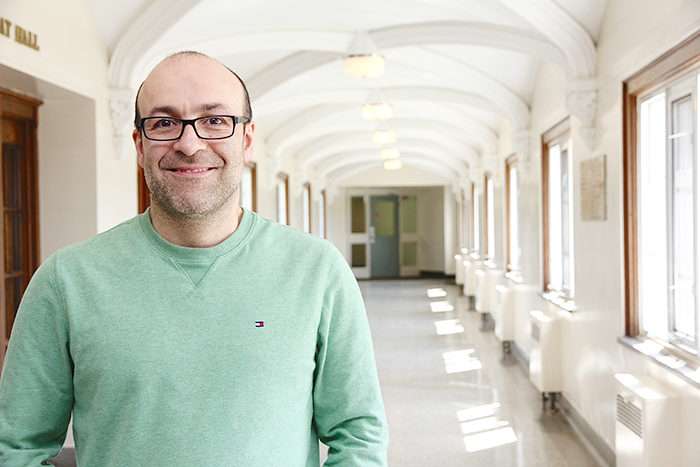Study says forget email, put a face on that plea

Forget that email, suggests one Western researcher. When you want results, look folks in the eye.
Despite the reach and speed of email, making a request to a person face-to-face is considerably more effective – 34 times more effective, in fact – according to research led by Mahdi Roghanizad, a Huron University College Department of Management and Organizational Studies professor. His study, "Ask in person: You're less persuasive than you think over email," recently appeared in the Journal of Experimental Social Psychology.
"I expected to see higher effectiveness in face-to-face – but not that much. Thirty-four times more effective is huge and exceptional," he said.
Given the prevalence of email- and text-based communication, Roghanizad said the study he conducted, with University of Waterloo professor Vanessa Bohns, was an opportunity to determine how email differs from face-to-face communication when we remove obvious nonverbal cues.
In the study, 45 participants asked 450 strangers (10 each) to complete a brief survey. All participants made the exact same request following the exact same script, however, half of the participants made their requests over email, half asked face-to-face.
While previous research aimed to identify effective influence techniques, this study explored people's assumptions about the effectiveness of their tactics.
Prior to making their requests, Roghanizad asked each participant to predict how many of the 10 strangers they asked would agree to fill out the survey. Participants in the face-to-face condition guessed, on average, 5 out of 10 people would agree. Participants in the email condition guessed, on average, 5.5 out of 10 people would agree.
The results revealed a great divide between the two.
Those who emailed their requests wildly overestimated the effectiveness of their digital pleas as they did not fully consider the value understanding and empathy that comes from face-to-face contact. On average, only 0.3 in 10 people participated in the survey pitched to them via email.
"Low compliance rate in emails is because the recipient doesn't build that initial trust," he said. "Even if you trust them, you wonder, 'Are they really in need and why aren't they asking me in person?' So, you ignore it. Trust leads to empathy. It doesn't happen in an email; it happens face-to-face."
Those who made face-to-face requests, however, underestimated the power of their in-person conversations, and sported a success rate closer to 8 in 10 people agreeing to take the survey.
These findings hold true across all relationships, Roghanizad said.
"With strangers, we like to avoid the awkwardness and embarrassment of approaching them. With an email, we get around that," he continued. "But even among friends, 50 per cent (of participants) said they would go with email over face-to face, simply for convenience.
"Asking a stranger face-to-face is significantly more effective compared with asking a friend through email. The moment you decide to go from face-to-face to email, you are lowering your chances, no matter who you ask – friends or strangers, it doesn't matter."
While Roghanizad recognizes face-to-face is not always feasible, such as in large fundraising campaigns, the numbers don't lie when it comes to results. As electronic communication remains the dominant means of interacting with others, his findings suggest users may not realize the limitations.
"If people also overestimate email's effectiveness, they may choose inferior means of influence without recognizing the downsides," he said. "Reflecting on the experience of receiving an email from a stranger, before making a request in this manner, may facilitate the practice of asking in person when possible. You'll get much better results."
More information: M. Mahdi Roghanizad et al. Ask in person: You're less persuasive than you think over email, Journal of Experimental Social Psychology (2017). DOI: 10.1016/j.jesp.2016.10.002
Journal information: Journal of Experimental Social Psychology
Provided by University of Western Ontario


















